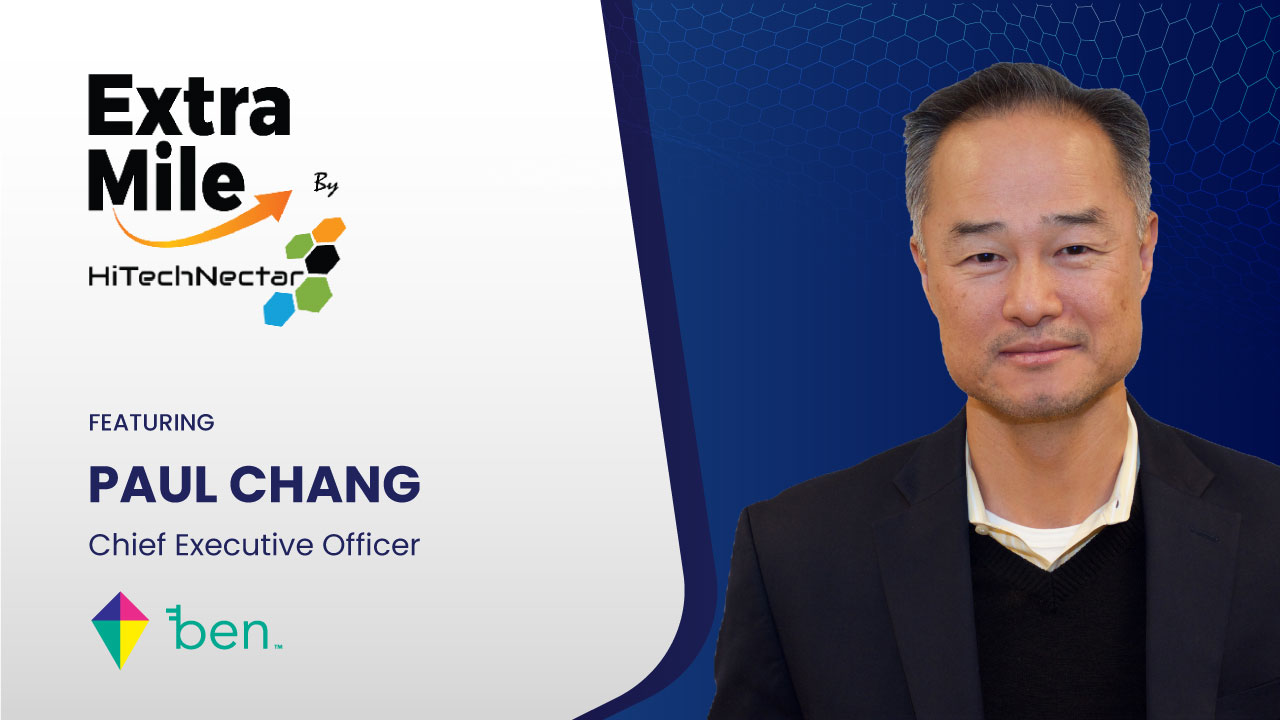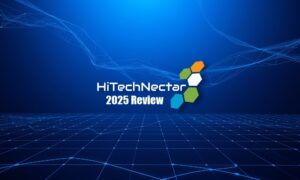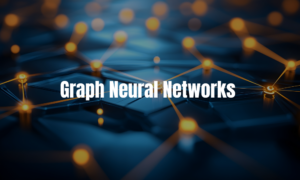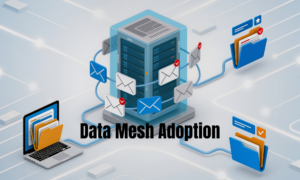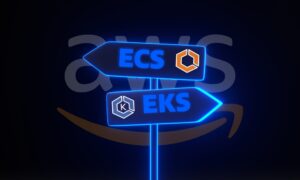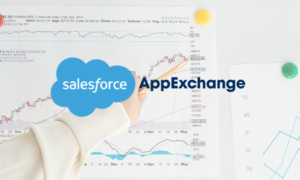Host: Hello and welcome everyone to another episode of ExtraMile by HiTechNectar, an interview series that bridges the gap between industry leaders and enthusiasts. I am your host, Sayali and we are here to discuss the latest innovations, tech trends, marketing practices, expert insights, and a lot more.
In this episode, we are thrilled to have Mr. Paul Chang with us, CEO of Brand Engagement Network, an AI-powered platform to accelerate audience engagement practices. Brand Engagement Network, also known as BEN, is a leader in offering personalized customer engagement tactics and Paul has been a distinctive contributor to the company’s success.
Let’s get a deeper understanding of Paul’s professional journey and evaluate the role of AI in boosting audience engagement.
Welcome, Paul! We are super excited to host you today.
Paul: Thanks, Sayali. I am super excited to chat with you.
Host: Amazing, So, Paul, can you walk us through your professional journey in the tech sector?
Paul: Sure. So, I joined Brand Engagement Network May of 2023. So, I have been here a little over a year.
I joined to be the global president and just recently, as of last month, I was promoted to the chief executive officer. So, I am super thrilled to be working with a very talented team here. And we have some very innovative and interesting technology that we are going to bring to the market.
Prior to BEN, I spent 18 years at IBM and my role there was to take these leading edge technology that IBM Research would develop and figure out how to take those to the market and sometimes even create a new market that didn’t exist before. Some examples of that would be obviously AI is one, even though back then it was more machine learning AI. Technology such as blockchain, I was very involved in that.
And new innovation such as IoT, this was a few years back. So that’s been my role at IBM and prior to IBM, I worked for a bunch of startup companies. So, I have kind of come back full circle here.
So, I worked for four different startup companies, some were wildly successful, where we went IPO and others were failures. But all along the way, I’ve learned quite a bit about how these technology companies get started, how to grow them, how to drive efficiency in order to scale the business. And I hope to use all of that experience and learning to help BEN scale and grow its business.
Host: Thank you, Paul. It’s inspiring to hear how you have managed to collect these milestones in your professional journey. So, moving on, as the CEO of BEN, what are the tasks that you regularly execute on a daily basis?
Paul: So, I do three things every day. And those three things are, first, I like to make sure that we have a commercial validation. And what I mean by commercial validation is even though we think the technology is great, we like to use it.
In fact, we use it ourselves. Just as a tidbit here, I used our AI assistant as part of our second quarter earnings call. So, if you look up the recording for earnings call, you actually see our AI assistant in action, where she’s providing key statistics like industry stats for me.
So obviously, we know the technology works, we believe in it, but we also need to get our customers from doing pilots and POCs into production. So, to me, that’s when the commercial validation really takes a foothold. And I am working every day to make that happen.
So, we have lots of pilots and POCs, and now we are at a point where we need to convert a few of those into production deployment. The second area where I spend a lot of time is inorganic growth. So as a public company, we have various different access to capital.
And we know that, I mean, if you think about generative AI, I would say every tech company can use it to enhance their offering, right? So, the field is really wide for us to acquire or partner with other companies. So, I spend a fair amount of time looking into that area, because we know that’s one of the fastest ways for a public company, such as ourselves, to grow, acquire customers and be able to scale our business very quickly, in addition to trying to grow the business organically.
And then the third piece is in order to support organic growth and these acquisition growth, we need scalable platform, meaning we are not in R&D, we can’t just deploy R&D assets, we need to deploy enterprise-grade software. And that’s what generative AI is. So we’ve been spending a ton of time to ensure not only does our technology work and be efficient, but it could actually be deployed and scale to meet the needs of our customers.
Host: All right. So, Paul, according to you, why is it important for businesses to prioritize audience engagement? Like, how does it contribute to enhancing user experience? And how can technology take advantage of this purpose?
Paul: Yes. Great question. So, you know, my philosophy is no matter how great a technology is, if users or customers don’t like to use it, then it’s not driving benefits for the company.
And I would say one example is like, you know, chatbots, right? You know, chatbots, I think, was a great idea because, hey, I can get all of my issues resolved just by typing into this little box. However, we saw the limitations of chatbots, right?
If you don’t use the right keyword or if you phrase a question differently, it just doesn’t know how to respond. And it gives you some generic menu item that you have to go to. So, you know, you try that a couple of times and then you realize, oh, boy, this is not very user friendly.
And most people stop using it, right? So, I think that’s where our technology is different, right? So, we are built to understand the natural language, spoken various different ways.
Questions can be phrased, you know, differently. Sentences could be structured differently, yet we would understand the intent of that question and be able to provide relevant, accurate answers very quickly. So, we think that that’s the best way for companies to support customers, right?
For them to be able to, you know, not only engage the company to get their questions answered, but then the companies can also do other things like, you know, they can do outreach to them, right? So, if the customers are used to engaging in certain platform, you can use that platform to do outreach for them. You can also provide obviously better customer service and experience, and perhaps you could even be proactive and make offers and potential enhancements to the products or services that they already utilize today and be able to do that without having to increase your staffing.
I think that’s the way that companies are going to better understand how to grow their business without, you know, increasing their costs significantly.
Host: Now, like speaking of AI, AI has been a revolutionary technological advancement in almost every sector. So according to you, what opportunities does multimodal AI unlock?
Paul: So, you know, and I mentioned that I worked for a startup company before and it was back in early 2000 and it was a telecom, right? We were actually providing the backbone technology for, you know, essentially website and e-commerce to operate properly. So, you know, obviously, Internet was huge when it was really launched and people began to figure out how they could utilize it.
And I think the consensus is that AI is going to be even larger and even adopted faster than sort of the, you know, Internet and e-commerce, you know, offerings for many businesses. So, you know, in order to, let’s say, be helpful, you need to be able to engage the customers. And in order to engage the customers, there has to be a certain amount of, let’s say, human like attributes.
And that’s where AI technology with its, you know, understanding and ability to speak. In addition to, you know, for us, we actually have an avatar that, you know, looks very much human-like, but, you know, not exactly human so that we know the users know that it’s not human, but they have sort of human-like attributes. So, they are comfortable engaging and talking with our AI avatar.
And we have done several studies where they, you know, show that, you know, people are actually more honest talking to an AI avatar versus even, you know, they are, you know, doctors or pharmacists. So, we know there are certain advantages of having AI-based avatar. And we think that is a key way to engage the consumers and be able to have a meaningful dialogue where you could, you know, gain insights from the conversation, be able to be more helpful to the users ultimately.
Host: Thank you for that answer. How is BEN utilizing AI to accelerate customer engagement while supporting the businesses?
Paul: Yes. And so, I am going to make a statement here that may not be well recognized in the industry. You know, when people say generative AI, there are more ways to do generative AI than just these open systems like, you know, ChatGPT or, you know, BARD or other systems that are essentially, you know, searching the internet for answers.
There are different ways to do it. So, I’ll just make that statement. So, our AI platform is three things.
Our AI is safe, our AI is intelligent, and our AI is scalable. So, if the AI isn’t safe, you’re not going to engage the consumers, right? No one’s going to use any technology that doesn’t provide the privacy and the security and the protection that is necessary on any sort of, you know, interaction, whether, and this is true for any interaction, right?
Whether you’re interacting with someone face-to-face at a grocery store or you’re, you know, doing something online, everyone’s going to want privacy and security and safety. And that’s what we bring to the table, meaning the conversation that we have, the inputs that you provide will never be leaked out to the internet for use by others, right? And so companies are particularly sensitive to this because any data that they have, it is, you know, it’s their trade secret, right?
Sort of the customers that they engage with or the products that they offer or technologies that they use, none of that should be leaked out to their potential competitors. So having safe AI is, I think, the most critical part about deploying a gen AI solution. The second is intelligent.
And what I mean by intelligent is our AI is very knowledgeable for very specific areas. So it’s different than the current AI offerings out there. We don’t have to have our AI assistant know everything about everything, but it should know a lot about certain topic areas.
Let’s say, you know, that’s about particular drugs or, you know, types of automobiles that you can buy. So, it has a sort of very targeted knowledge and that’s by design, right? We don’t want it to write term papers for kids.
We want it to answer very specific questions about the type of drug that someone might be taking. The third piece is that our AI is scalable, right? At the end of the day, I think, again, and I use a term paper as an example because I’m sure, you know, my kids have used it, but, you know, yeah, if you’re just doing, you know, one-time term paper, that’s fantastic.
But if you’re running a business where you serve as hundreds of millions of customers, well, any technology needs to scale to that level. And when I say scale, you need to scale both on the front end and on the back end. So, on the front end, you know, you have to be able to meet the customers where they are.
So, you know, most consumers are not mobile-driven, but they can still use, you know, laptops or desktops. If you’re, let’s say, a physician that’s, you know, walking around with laptops to be able to, you know, consult with different patients. We actually even have a life-size kiosk that could be used, let’s say, storefronts or, you know, any company that wants to sort of highlight the technology and be helpful to the consumers walking through the door.
And we also use what’s called a small language model. So, our language models are, you know, a couple of orders of magnitude smaller than those publicly available. And what that does is that gives the companies the ability to scale in a very cost-effective manner.
As you can imagine, you’re sifting through, you know, smaller data set, then you should be able to drive results faster and be able to, you know, scale to meet the growing demands of your business.
Host: So just adding on to that, we all know that like scalable initiatives are crucial for any business. How can AI enable high scalability for companies?
Paul: Sure. So, you know, I want to just share maybe just a few examples of how we’re doing that. So, one of the examples, and, you know, this is a customer and a partner of ours called MedAdvisor, and they provide drug information to about 80% of the US pharmacies.
So clearly a big player in the pharmaceutical space. You know, their data set has been well vetted and validated by various different sources. And we are essentially providing patient support, working with MedAdvisor.
So, if you want to know about particular drugs, we provide that information. If it’s, you know, let’s say it’s the fall right now. So, this is sort of the, you know, the flu season or the vaccine season.
So, we can do outreach and provide information about different vaccines, you know, when you should take them, who can take them, what are the side effects and what are the benefits? And, you know, can you take multiple at the same time? You know, there’s lots and lots of questions.
And, you know, searching that answer on the internet may not be the best way to do this, right? Because you may or may not get the correct answer. So, we are working with MedAdvisor to provide that information and make sure that, you know, people are taking meds on a timely manner to ultimately improve their, you know, health condition.
The other couple examples we have is a company called Intervent and Members Only Health, you know, who provide a concierge type service. And we not only engage the consumers, we’re also engaged to train the internal staff so that they are more knowledgeable, more helpful and provide better responses to the customers that they interact with. And lastly, I’d like to highlight a business partner of ours in Mexico, a company called Vibro and Pharmacia Roma, which is another large pharmacy chain based out of California, but operating primarily in Mexico.
And they want to engage the customers as they walk through the pharmacy, be able to engage with them through an audio system that’s already embedded into the pharmacy, obviously providing helpful information as well as maybe offers that the consumers may be looking for. And it’s an easy audio way to do it without, you know, let’s say, wasting any customers time or becoming a distraction. We are still able to deliver the sort of the right message at the right time to those customers.
Host: As we’re aware, BEN aims to create helpful, creative, clever and friendly AI assistants. How does the company strategize to achieve this goal?
Paul: Yeah, so I think, again, it comes to user experience. And, you know, most people are willing to engage, let’s say, digital technology as long as they feel that it’s providing the right information, solving the problems for them and having sort of a more natural human-like interaction. And I think, you know, typing into a little, you know, chat box can work sometimes.
But in general, I think most people, we interact with each other like you and I are interacting right now, which is we’re having a conversation. And I think that’s the most sort of the natural, comfortable way for, you know, companies to engage their consumers. So, you know, not only should we be providing information, but the AI assistants should also make their tasks a little bit easier for the consumers.
So, one example might be, you know, I talked about the vaccine education. You know, for vaccines, you have to fill out a form here in the U.S. So, if I could provide my information to the AI assistant and it can fill out the form, that makes my life a little bit easier. And if it could help me make appointments for the time when it’s available, that’s also very helpful.
And so, AI assistants should be doing more than just sharing information or sharing knowledge. It should be completing certain, you know, tasks that will drive efficiency for the business and is also providing helpful service to the consumer. So, you know, our ability to provide both the responses and or answers, but to complete certain tasks on behalf of the businesses, I think that is going to be critical in wide scale adoption, because now you’re not just doing one thing, you’re able to do multiple things.
And you could also be integrated with backend systems of the businesses because, you know, no technology, no matter how cool it is or how great it is, it cannot operate in a silo for most businesses. It has to be integrated with other, let’s say, legacy systems. It has to be integrated into their business processes.
And in order to do that, you need to have other, you know, I’ll use the term middleware technology to make that happen. So, you know, BEN has both the front end, the middle layer and the backend. And that’s what gives us the full control over the customer engagement and the experience.
Host: As we wrap up, impactful leadership is a core component of any growing business. Are there any specific leadership qualities you believe contribute in gaining success and fostering positive work environment?
Paul: Well, that’s a, you know, sort of a personal question. So, I appreciate that. So, my philosophy there, and I think this is probably adopted by many leaders, right?
We want to make decisions quickly. We want to capture market share quickly. And, you know, some of those decisions will be good.
Some of those will not. But we want to make sure that if we’re going to succeed, we succeed quickly. If we make mistakes, we want to fail quickly so that we could adjust and adapt and perhaps even pivot.
So far, our strategy has been on point. So, we are targeting a couple of markets, vertical markets, healthcare and automotive. And we’ve been quite successful in doing so, even though our technology is actually quite horizontal.
So, my encouragement to the staff member is that, you know, they could be innovative. They can push themselves. And we have a very flat organization.
So, you know, everyone has their voice heard so that we could get the sort of the power of collective ideas and innovation from every single employee versus, you know, just a handful of people in management, you know, driving those decisions. So having a flat organization, encouraging everyone to speak up with ideas. And even if some of those ideas do not pan out, we’re OK with that.
We’re OK to learn quickly and make adjustments quickly and be able to capture the market. Because even though we have, you know, lots of patents, we know we are we’ve been building safe AI for five years now. So, we are ahead of our competitors.
It’s still a race. And we want to make sure that we get to the finish line, even though we started faster. We want to make sure we get to the finish line before anyone else.
So having a company and the staff that knows that they have the full support of management to be able to get creative, innovative and to drive decisions faster. That will be critical to our success.
Host: Thank you, Paul. Appreciate the answer. And just to end this on a fun and light note. If you could have any superpower, what would it be and why?
Paul: Oh boy, any superpower. Obviously, I think the easy one would be, you know, if you could predict a little bit of the future, right? I think that would be a great superpower because you could make, you know, I would say, you know, it’ll be like an informed decision because you are you know exactly what’s going to happen.
But I think the other way to get to that superpower is if you make decisions and if you have built processes in a way that allows you to, you know, understand and predict the future as quickly as you can. So obviously, you don’t have the 100% certainty, but I do believe that there are things that you can do to minimize the risk and increase the certainty that the strategy that you’re taking is indeed what’s going to pan out as a successful strategy in the future. So, while it’s not a superpower, I think it’s getting close to having that superpower.
And who knows, sometimes our AI assistant could actually even help me think through those things.
Host: Thank you, Paul. The insights you have shed light on are truly valuable to us. Thank you so much for sharing such informative perspectives on future of AI leadership and bench strategies.
Once again, thank you so much, Paul.
Paul: Thanks, Sayali. Nice chatting with you.
Host: Likewise. Thank you all for being part of today’s discussion. I’m Sayali, your host, signing off.
Join us in the next episode of Extra Mile by High Tech Nectar, where we’ll have another extraordinary leader sharing their insights. Until then, please stay tuned.
Explore Our Other Insightful Interviews:


